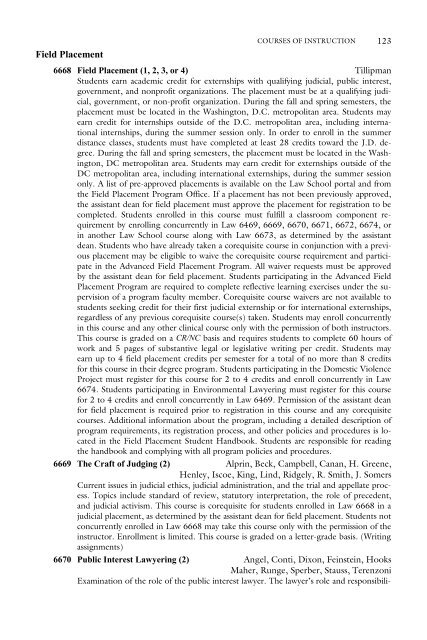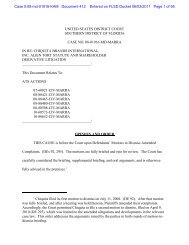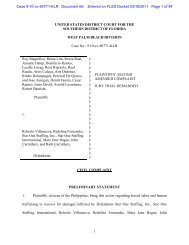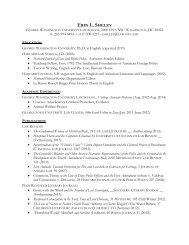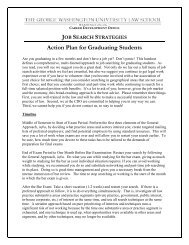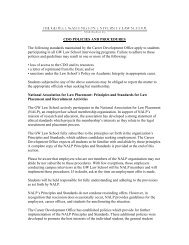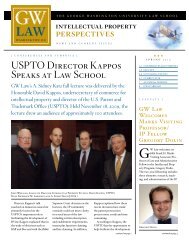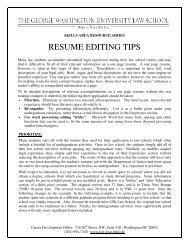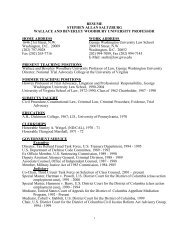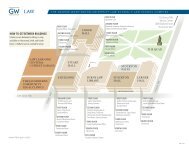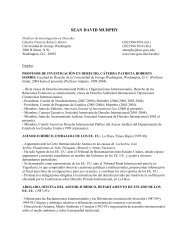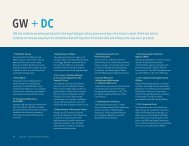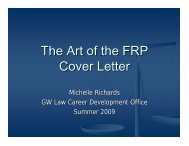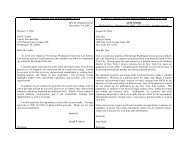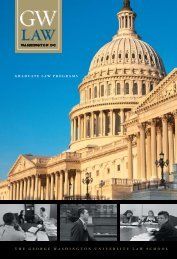The Bulletin - George Washington University Law School
The Bulletin - George Washington University Law School
The Bulletin - George Washington University Law School
- No tags were found...
You also want an ePaper? Increase the reach of your titles
YUMPU automatically turns print PDFs into web optimized ePapers that Google loves.
Field PlacementCOURSES OF INSTRUCTION 1236668 Field Placement (1, 2, 3, or 4) TillipmanStudents earn academic credit for externships with qualifying judicial, public interest,government, and nonprofit organizations. <strong>The</strong> placement must be at a qualifying judicial,government, or non-profit organization. During the fall and spring semesters, theplacement must be located in the <strong>Washington</strong>, D.C. metropolitan area. Students mayearn credit for internships outside of the D.C. metropolitan area, including internationalinternships, during the summer session only. In order to enroll in the summerdistance classes, students must have completed at least 28 credits toward the J.D. degree.During the fall and spring semesters, the placement must be located in the <strong>Washington</strong>,DC metropolitan area. Students may earn credit for externships outside of theDC metropolitan area, including international externships, during the summer sessiononly. A list of pre-approved placements is available on the <strong>Law</strong> <strong>School</strong> portal and fromthe Field Placement Program Office. If a placement has not been previously approved,the assistant dean for field placement must approve the placement for registration to becompleted. Students enrolled in this course must fulfill a classroom component requirementby enrolling concurrently in <strong>Law</strong> 6469, 6669, 6670, 6671, 6672, 6674, orin another <strong>Law</strong> <strong>School</strong> course along with <strong>Law</strong> 6673, as determined by the assistantdean. Students who have already taken a corequisite course in conjunction with a previousplacement may be eligible to waive the corequisite course requirement and participatein the Advanced Field Placement Program. All waiver requests must be approvedby the assistant dean for field placement. Students participating in the Advanced FieldPlacement Program are required to complete reflective learning exercises under the supervisionof a program faculty member. Corequisite course waivers are not available tostudents seeking credit for their first judicial externship or for international externships,regardless of any previous corequisite course(s) taken. Students may enroll concurrentlyin this course and any other clinical course only with the permission of both instructors.This course is graded on a CR/NC basis and requires students to complete 60 hours ofwork and 5 pages of substantive legal or legislative writing per credit. Students mayearn up to 4 field placement credits per semester for a total of no more than 8 creditsfor this course in their degree program. Students participating in the Domestic ViolenceProject must register for this course for 2 to 4 credits and enroll concurrently in <strong>Law</strong>6674. Students participating in Environmental <strong>Law</strong>yering must register for this coursefor 2 to 4 credits and enroll concurrently in <strong>Law</strong> 6469. Permission of the assistant deanfor field placement is required prior to registration in this course and any corequisitecourses. Additional information about the program, including a detailed description ofprogram requirements, its registration process, and other policies and procedures is locatedin the Field Placement Student Handbook. Students are responsible for readingthe handbook and complying with all program policies and procedures.6669 <strong>The</strong> Craft of Judging (2) Alprin, Beck, Campbell, Canan, H. Greene,Henley, Iscoe, King, Lind, Ridgely, R. Smith, J. SomersCurrent issues in judicial ethics, judicial administration, and the trial and appellate process.Topics include standard of review, statutory interpretation, the role of precedent,and judicial activism. This course is corequisite for students enrolled in <strong>Law</strong> 6668 in ajudicial placement, as determined by the assistant dean for field placement. Students notconcurrently enrolled in <strong>Law</strong> 6668 may take this course only with the permission of theinstructor. Enrollment is limited. This course is graded on a letter-grade basis. (Writingassignments)6670 Public Interest <strong>Law</strong>yering (2) Angel, Conti, Dixon, Feinstein, HooksMaher, Runge, Sperber, Stauss, TerenzoniExamination of the role of the public interest lawyer. <strong>The</strong> lawyer’s role and responsibili-


